In the world of digital networks, there exist tools that serve as silent watchers, capturing and deciphering the hidden language of data packets. These tools are known as packet sniffers.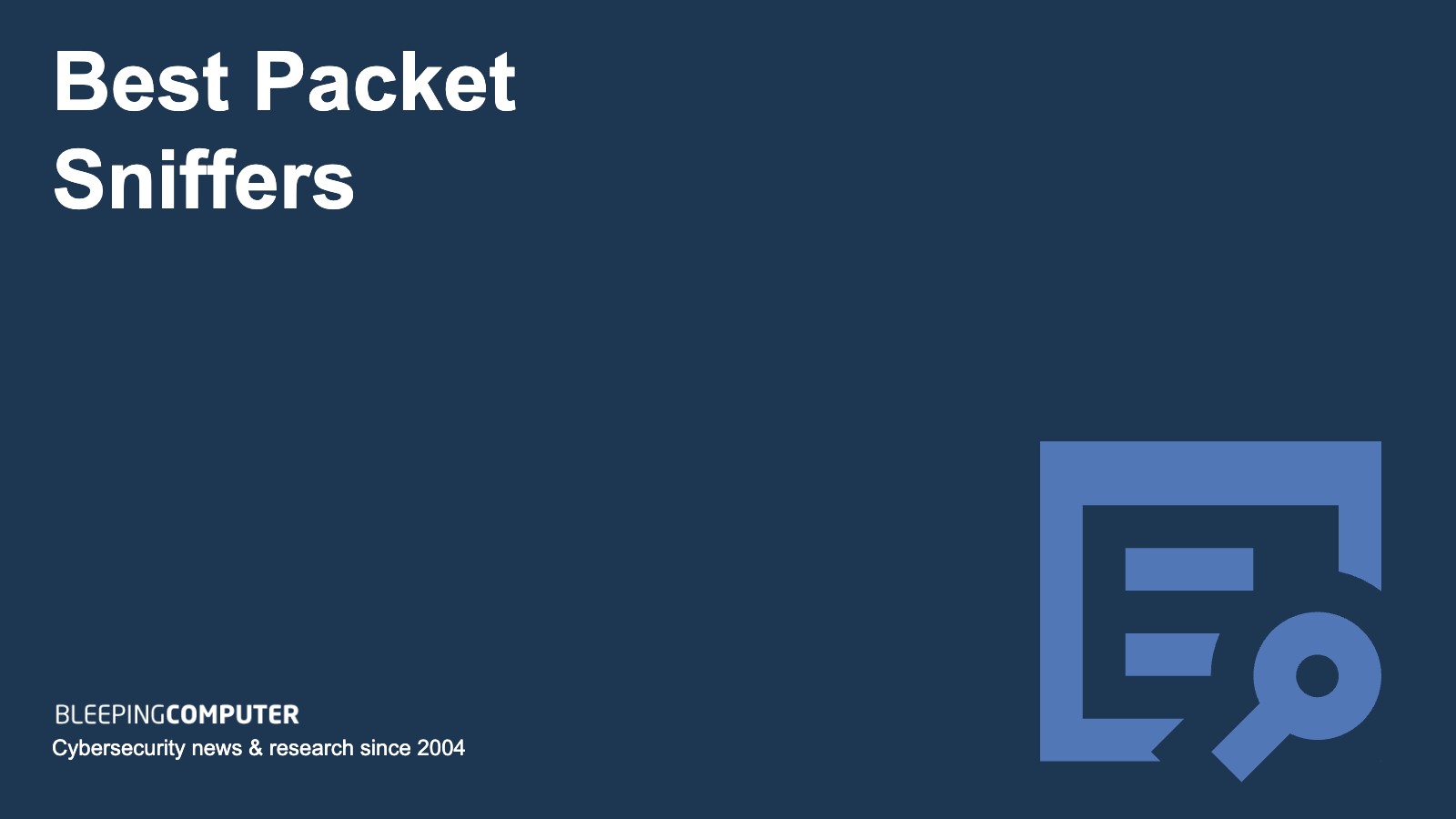
Packet sniffers are the tools that grant us visibility into the hidden realm of digital networks, allowing us to see and make sense of the data packets that carry information back and forth. In this article, we explore the best packet sniffers out there to guide you in choosing the right one for your network.
Here is our list of the best packet sniffers:
- SolarWinds Deep Packet Inspection and Analysis Tool (EDITOR'S CHOICE): A great tool for deeper visibility into network traffic, application performance, security, and more. It offers a holistic view of network health. Its user-friendly interface simplifies complex tasks, ensuring ease of use for IT professionals. A 30-day free trial is available on request.
- ManageEngine NetFlow Analyzer (FREE TRIAL): An affordable packet sniffer that provides actionable insights and analyzes aggregated traffic data. This makes it effective for sizable networks. A 30-day free trial is available on request.
- PRTG Network Monitor (FREE TRIAL): A versatile solution for real-time monitoring and insights, and troubleshooting capabilities. Ideal for organizations of all sizes. Download a 30-day free trial.
- Wireshark: A powerful tool for network analysis, catering to expert users and network professionals tackling complex network issues.
- Tcpdump: A powerful tool for experienced network professionals. Ideal for environments requiring in-depth analysis and minimal resource impact.
- Capsa Network Analyzer: A handy packet sniffer for monitoring, troubleshooting, and analyzing wired and wireless networks with features for deeper insights into network performance.
- Omnipeek Network Protocol Analyzer (NPA): Combines real-time and historical capture, deep packet inspection, and advanced analysis tools for in-depth network monitoring.
- Fiddler: A great tool for anyone or organization who needs to inspect, modify, and analyze web traffic.
- Snort: A popular open-source network IDS/IPS that operates by monitoring network traffic for suspicious activity.
- NetworkMiner: A valuable forensic analysis tool for extracting and analysing information and artifacts from network traffic.
The best packet sniffers
Our methodology for selecting a packet sniffer tool
When choosing the packet sniffers featured in this list, we carefully considered various factors to ensure that each tool aligns effectively with the needs of your organization. Some factors include:
- Popularity and user base: We looked for tools that are widely used and have a large user base, as this often indicates a mature and well-supported product.
- Feature set: We considered the range of features offered by each sniffer, such as deep packet inspection, filtering capabilities, protocol support, and analysis tools.
- Ease of use: We included options suitable for both beginners and experienced users, with some offering graphical interfaces and others requiring command-line expertise.
- Cost: We included both free (open-source) and paid options, recognizing that budget can be a significant factor for users.
- Specific use cases: We considered the different needs of various users, such as network troubleshooting, security analysis, web debugging, and network forensics.
By considering these factors, we aimed to provide a diverse selection of packet sniffers that cater to various needs and technical backgrounds. Ultimately, your best choice depends on your specific requirements and preferences.
1. SolarWinds Deep Packet Inspection and Analysis Tool (FREE TRIAL)
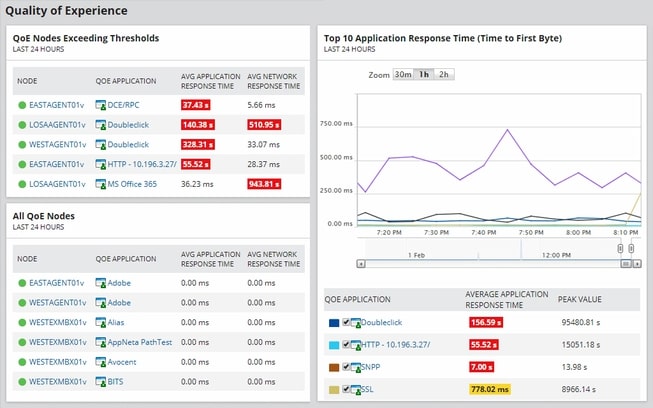
The SolarWinds Deep Packet Inspection and Analysis Tool (DPI) is a powerful network monitoring solution embedded within SolarWinds Network Performance Monitor (NPM) software. Its significance lies in its ability to address various aspects of network management, including troubleshooting application performance issues and detecting security threats.
Key features of SolarWinds DPI:
- Deep packet inspection: Analyzes the contents of data packets to identify applications, protocols, and user activity within network traffic
- Application identification: Recognizes and categorizes various applications traversing the network, providing insights into their usage and performance
- Performance monitoring: Monitors application response times, identifies bottlenecks, and helps troubleshoot performance issues
- Network forensics: Enables investigation of suspicious activity, malware detection, and analysis of security incidents
- Traffic visualization: Provides graphical representations of network traffic patterns for easier analysis and identification of anomalies
Why do we recommend it and for whom?
One of the primary reasons for recommending the SolarWinds DPI tool is its comprehensive analysis capabilities. By combining deep packet inspection with application identification and performance monitoring, it offers a holistic view of network health. Its user-friendly interface simplifies complex tasks, ensuring ease of use for IT professionals. It is best suited for medium to large enterprises and MSPs with complex networks experiencing performance issues.
Pros:
- Comprehensive analysis: Offers a powerful combination of deep packet inspection, application identification, and performance monitoring for in-depth network insights
- Improved troubleshooting: Helps pinpoint the root cause of application performance issues by analyzing traffic patterns and resource utilization
- User-friendly interface: Simplifies complex tasks with intuitive dashboards and pre-configured options for easier setup and use
- Scalability: Adapts to growing network demands with flexible licensing options and support for distributed deployments
Cons:
- Complexity: While user-friendly, advanced configuration and analysis might require some technical expertise. It’s therefore not ideal for home users or hobbyists
Overall, SolarWinds DPI is a great tool for deeper visibility into network traffic, application performance, security, and more. Nonetheless, it's crucial to consider the potential drawbacks, such as cost, and complexity concerns before making a decision. You can download Network Performance monitor on a 30-day free trial.
2. ManageEngine NetFlow Analyzer (FREE TRIAL)
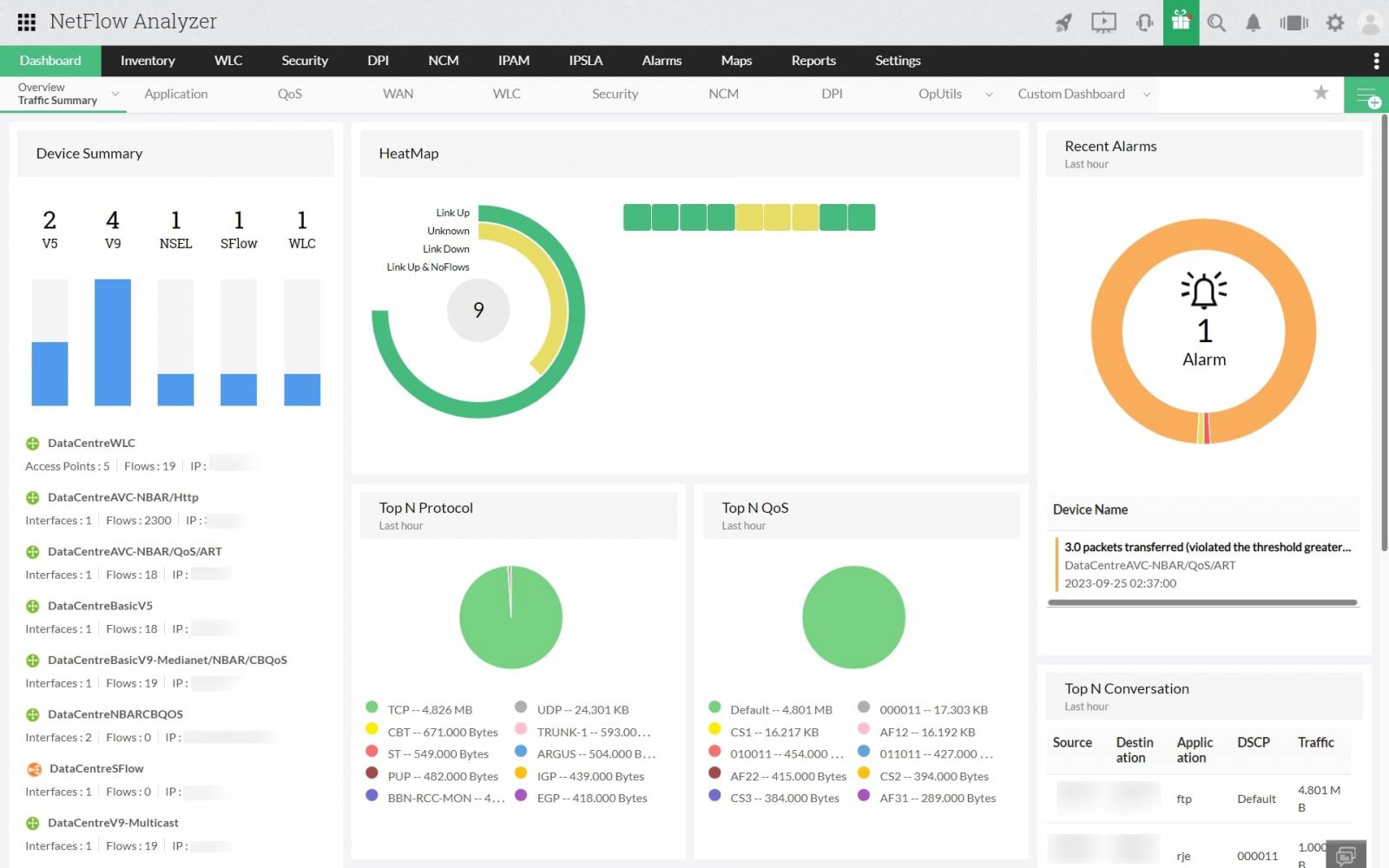
ManageEngine NetFlow Analyzer is a network traffic analysis tool that utilizes flow data collected from network devices to provide insights into bandwidth usage, application performance, and potential security threats. Unlike traditional packet sniffers that capture individual packets, NetFlow Analyzer focuses on analyzing aggregated traffic data, making it efficient for large networks.
Key features:
- Network Traffic Analysis (NTA): Provides insights into network stability, performance degradation, device capabilities, and traffic patterns
- Protocol and application monitoring: Monitor, map, and group enterprise-specific applications based on user requirements
- Traffic shaping: Prioritize and differentiate traffic for critical users and applications
- NBAR monitoring: Categorize applications using dynamic ports with NBAR monitoring
- Bandwidth management: Monitor and control bandwidth usage across network elements for optimized performance
- Flow-based monitoring: Analyze flow data to provide visibility on traffic flow and volume, including J-Flow, sFlow, IPFIX, and Netflow monitoring
Why do we recommend it and for whom?
ManageEngine NetFlow Analyzer stands out by offering cost-effective, scalable network traffic analysis without the complexity of traditional packet sniffers. Its focus on flow data analysis makes it efficient for large networks while providing valuable insights into application usage, security, and compliance, catering to diverse organizations from budget-conscious SMBs to security-focused enterprises.
Pros:
- Cost-effective: Offers a free version with core features, making it accessible to budget-conscious organizations
- Scalable: Efficiently handles large network deployments with flow data processing, minimizing resource impact
- Ease of use: User-friendly interface simplifies traffic analysis, reporting, and navigation, even for non-technical users
Cons:
- Reliance on flow data: Primarily relies on flow data, this may offer less granular insights compared to traditional packet sniffers that capture individual packets
NetFlow Analyzer is a cost-effective packet sniffer with actionable insights. However, if you require deeper packet-level analysis or real-time monitoring capabilities, alternative solutions might be more appropriate. You can download a 30-day free trial.
3. PRTG Network Monitor (FREE TRIAL)
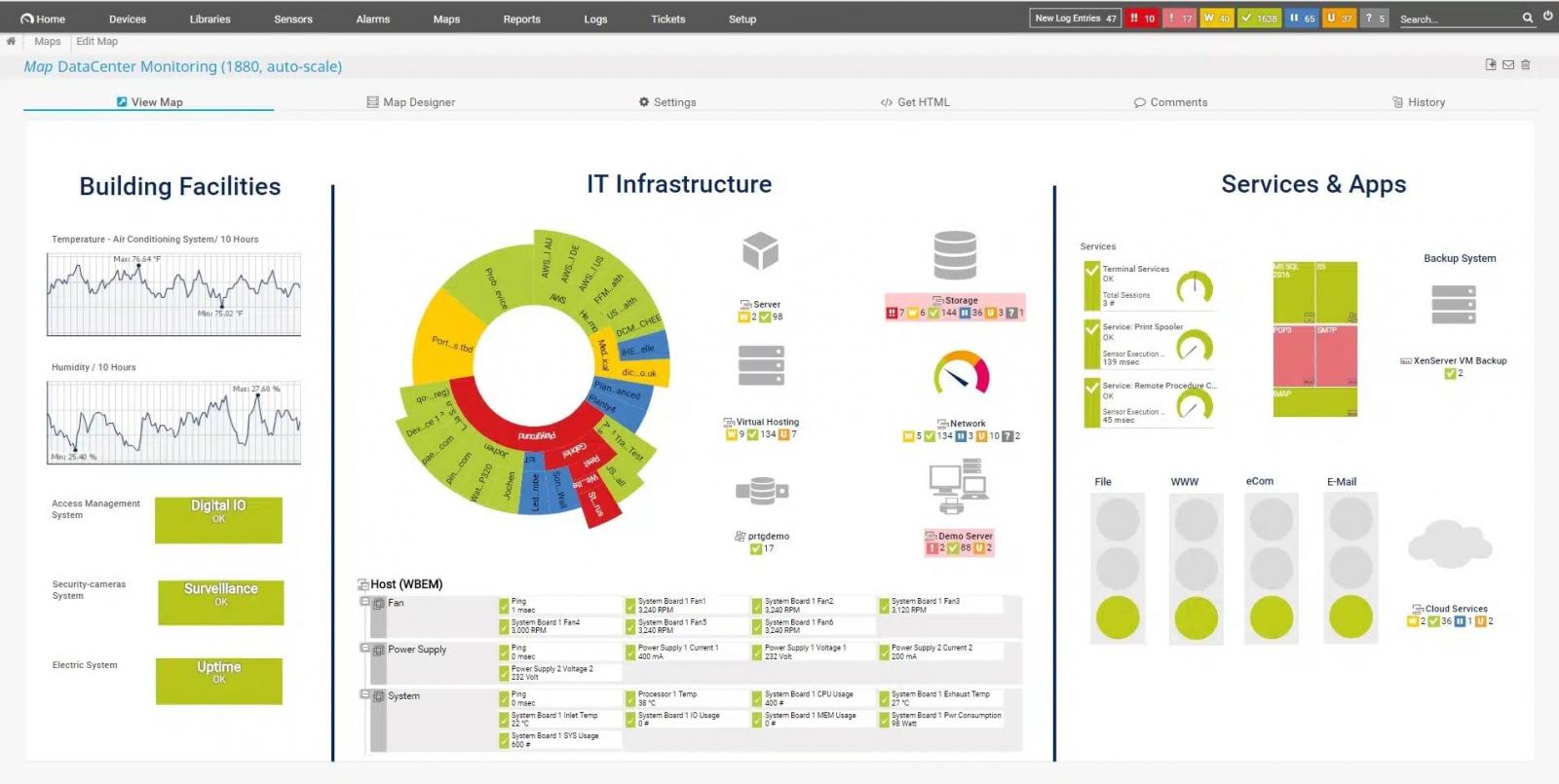
PRTG Network Monitor is an all-in-one network monitoring solution offering both packet capture and real-time monitoring capabilities. It simplifies network management with pre-configured sensors and user-friendly dashboards.
Key features of PRTG:
- Real-time monitoring: Provides real-time insights into network performance, resource utilization, and application health
- Packet capture: Enables capturing network traffic for deeper analysis and troubleshooting
- Pre-configured sensors: Offers a wide range of pre-configured sensors for various devices, protocols, and applications
- Alerting and notifications: Sends alerts and notifications for potential issues and performance anomalies
Why do we recommend it and for whom?
We would recommend PRTG Network Monitor to organizations seeking a user-friendly and comprehensive network monitoring solution that goes beyond basic metrics. It differentiates itself by combining real-time network monitoring with packet capture capabilities in a user-friendly and all-in-one solution. This makes it ideal for organizations of all sizes seeking comprehensive network oversight without unnecessary complexities.
Pros:
- All-in-one solution: Combines real-time monitoring with packet capture, eliminating the need for separate tools
- Ease of use: User-friendly interface and pre-configured sensors simplify setup and management
- Cost-effective: Offers various pricing plans to suit different budgets
Cons:
- Learning curve: While user-friendly, advanced features might require some technical understanding
- Resource requirements: Running PRTG can be resource-intensive on lower-end hardware
PRTG Network Monitor is a versatile solution for real-time insights and deeper troubleshooting capabilities through packet capture. Its user-friendly interface and scalability make it suitable for various organizations. Download a 30-day free trial.
4. Wireshark
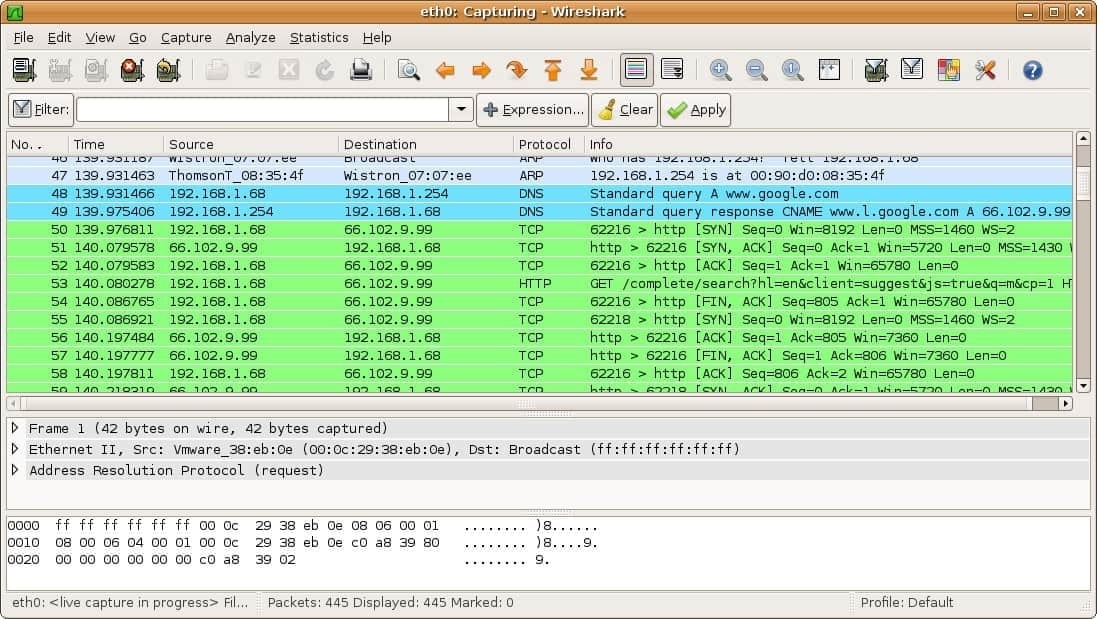
Wireshark is a free cross-platform open-source packet analyzer used for network troubleshooting, analysis, software, and communications protocol development, and education. It lets you examine network traffic data from a live network or a capture file on disk for protocol inspection and analysis in real-time.
Key features of Wireshark:
- Packet capture: Captures network traffic packets from various network interfaces for detailed analysis
- Deep packet inspection: Analyzes the contents of captured packets to understand protocols, applications, and data flow
- Protocol support: Supports a wide range of protocols, enabling comprehensive analysis of diverse network traffic
- Filtering and search: Powerful filtering and search capabilities allow you to focus on specific traffic based on various criteria
Why do we recommend it and for whom?
We recommend Wireshark for experienced users and network professionals. Wireshark stands out as a free, open-source powerhouse for deep packet inspection, offering unparalleled protocol support and customization options. Its powerful features cater to expert users and network professionals tackling complex troubleshooting, security analysis, and protocol research.
Pros:
- Open-source and free: Freely available for download and use, making it accessible to everyone
- Cross-platform: Runs on various operating systems, including Windows, macOS, and Linux
- Large community and resources: Benefits from a vast community of users and developers providing support, tutorials, and plugins
- Highly customizable: Can be customized with plugins and scripts to extend functionality and cater to specific needs
Cons:
- Steep learning curve: The user interface can be complex for beginners, requiring some technical knowledge to navigate effectively
- Potential for misuse: Powerful features can be misused for malicious purposes if not used responsibly and ethically
Wireshark is indeed a powerful tool for network analysis. However, its complexity and resource requirements make it less suitable for casual users or situations requiring real-time monitoring.
5. Tcpdump
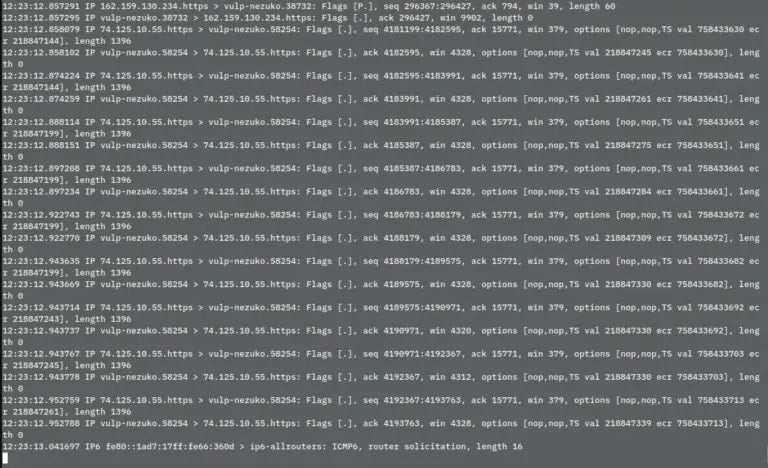
TCPdump is a free command-line packet analyzer tool that permits users to view TCP/IP and various other packets being sent or received via a network connected to the computer. It works on most Unix-like operating systems as well as Windows.
Key features:
- Command-line interface: Offers flexible control and scripting capabilities for advanced users
- Deep packet inspection: Captures and analyzes individual packets, providing detailed insights into network traffic
- Extensive filtering: Powerful filtering options allow you to focus on specific traffic based on various criteria
- Highly customizable: Supports scripting and automation for tailored analysis workflows
Why do we recommend it and for whom?
Tcpdump stands out as a powerful, command-line tool offering deep packet inspection at its core. While lacking a graphical interface and requiring technical expertise, it excels in efficiency and resource usage. It is ideal for experienced users, network professionals, and script-driven automation in environments demanding in-depth analysis and minimal resource impact.
Pros:
- Powerful and efficient: Offers deep packet inspection capabilities with efficient resource usage
- Portable and lightweight: Runs on various platforms without significant resource impact
- Open-source and free: Freely available for download and use, making it accessible to everyone
Cons:
- Steep learning curve: This can be challenging for beginners due to the lack of a graphical interface
- Manual analysis required: Captured packets require manual interpretation and analysis, which can be time-consuming
Tcpdump is a powerful tool for experienced network professionals. Its command-line interface and lack of a graphical interface make it less suitable for beginners or those seeking user-friendly solutions. However, its open-source nature and extensive features make it a valuable option for environments requiring in-depth analysis and minimal resource impact.
6. Capsa Network Analyzer
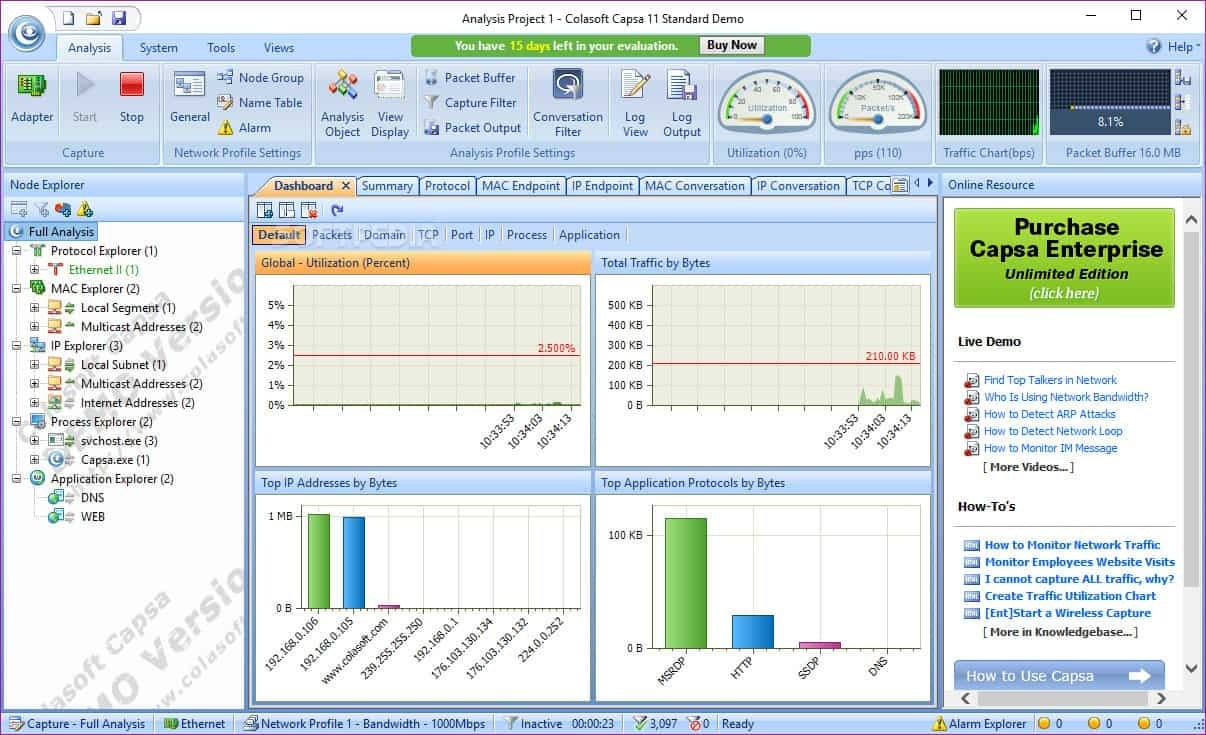
Capsa Network Analyzer is a software tool developed by Colasoft specifically designed for monitoring, troubleshooting, and analyzing wired and wireless networks. It offers a range of features to help network administrators gain deeper insights into network traffic, identify performance issues, and enhance security.
Key features:
- Real-time packet capture: Captures network traffic in real-time, allowing you to analyze ongoing communication between devices
- Deep packet inspection: Analyzes the contents of captured packets to understand protocols, applications, and data flow within the network
- Traffic filtering and search: Provides powerful filtering and search capabilities to focus on specific traffic based on various criteria
- Network performance analysis: Identifies bottlenecks, analyzes application performance, and helps optimize resource allocation
Why do we recommend it and for whom?
Its competitive advantage lies in its combination of user-friendliness, powerful features, and specific functionalities tailored for network professionals. Its real-time capture, deep packet inspection, and automated analysis capabilities empower efficient identification of performance bottlenecks, potential threats, and root causes of network issues.
Pros:
- Improved network performance: Helps identify and resolve performance bottlenecks, leading to smoother network operation
- Simplified troubleshooting: Provides tools for efficient troubleshooting of network issues, saving time and resources
Cons:
- Licensing cost: Capsa Network Analyzer is a paid software solution with various licensing options
Capsa Network Analyzer's user-friendly interface and powerful features make it suitable for various network professionals, but it's crucial to evaluate your specific needs and resources before making a decision.
7. Omnipeek Network Protocol Analyzer (NPA)
.jpg)
Omnipeek NPA is a packet analyzer tool for network troubleshooting and protocol analysis. It empowers network professionals to not only troubleshoot current issues but also investigate past network behavior for deep insights.
Key features:
- Real-time and historical packet capture: Captures network traffic in real-time for immediate analysis, or allows historical data collection for retrospective investigation
- Deep packet inspection: Analyzes the contents of captured packets to understand protocols, applications, and data flow within the network
- Traffic filtering and search: Provides advanced filtering and search capabilities to focus on specific traffic based on various criteria
Why do we recommend it and for whom?
Omnipeek Network Protocol Analyzer stands out for its powerful combination of real-time and historical capture, deep packet inspection, and advanced analysis tools. We recommend it for organizations seeking a robust and user-friendly solution for in-depth network monitoring, security analysis, and efficient troubleshooting.
Pros:
- Improved network performance: Helps identify and resolve performance bottlenecks, leading to smoother network operation
- Multi-segment analysis: This allows users to analyze network traffic across different segments simultaneously for comprehensive insights
Cons:
- Resource intensive: This may consume significant system resources, especially when analyzing large volumes of network traffic, potentially impacting system performance
Omnipeek NPA’s extensive features and ease of use makes it suitable for networks of all sizes, but it's crucial to evaluate your specific needs and resources before making a buying decision.
8. Fiddler
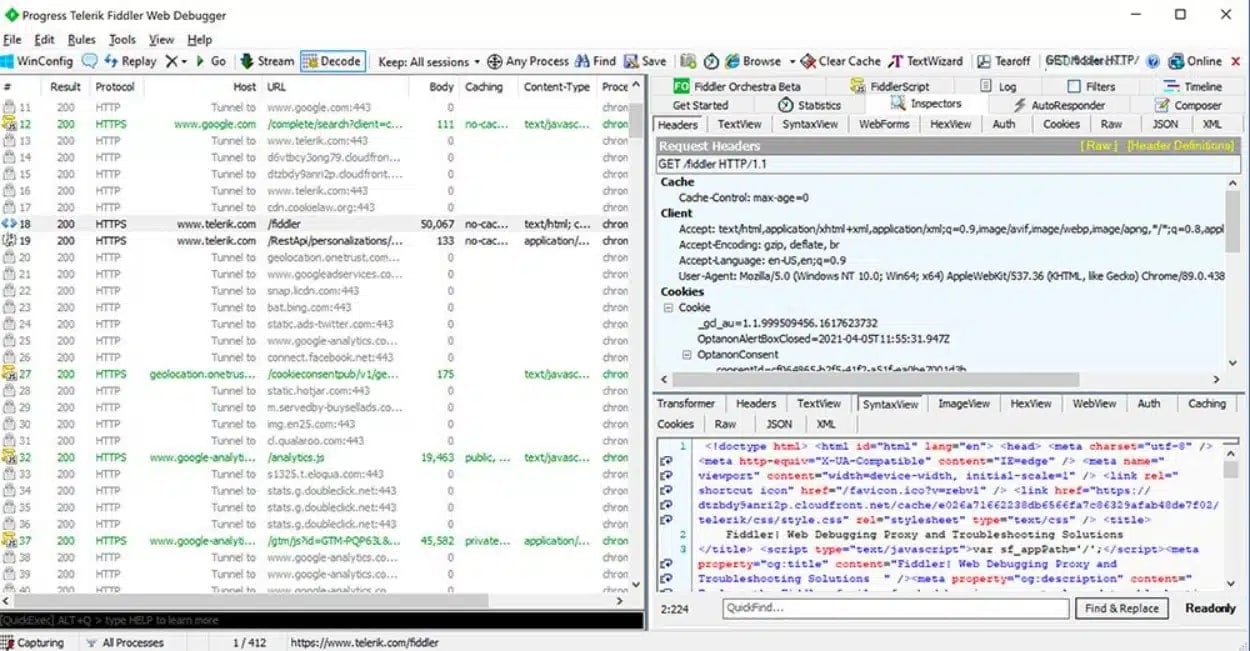
Fiddler, created by Telerik, is a powerful web debugging proxy tool. It serves as a mediator between your browser and the Internet, capturing network traffic between the Internet and test computers. This enables you to inspect, modify, and analyze both inbound and outbound web traffic.
Key features:
- Real-time traffic capture: Captures and displays all HTTP traffic in real-time, allowing you to see what's happening as you browse
- Traffic inspection and modification: Inspect and modify individual requests and responses, including headers, content, and cookies
- Powerful filtering and search: Easily filter and search through captured traffic based on various criteria
- Script recording and playback: Automate repetitive tasks by recording and playing back scripts
Why do we recommend it and for whom?
While other tools often prioritize specific aspects, Fiddler stands out for its cross-platform compatibility, free basic version, and extensive community support, and this gives it its competitive advantage, especially in web debugging and network analysis. Its ability to capture, inspect, and modify traffic in real-time gives developers and network admins the tools they need to troubleshoot issues, optimize performance, and conduct security assessments effectively.
Pros:
- Free and open-source: A free basic version is available, with paid versions offering additional features
- Cross-platform: Available for Windows, macOS, and Linux
- Extensive community: Benefits from a large and active community offering support and resources
Cons:
- Limited real-time editing: The free version has limitations on real-time editing of traffic
Fiddler is a great tool for anyone or organization who needs to inspect, modify, and analyze web traffic. Its user-friendly interface, powerful features, and cross-platform support make it a popular choice for both beginners and experienced users.
9. Snort
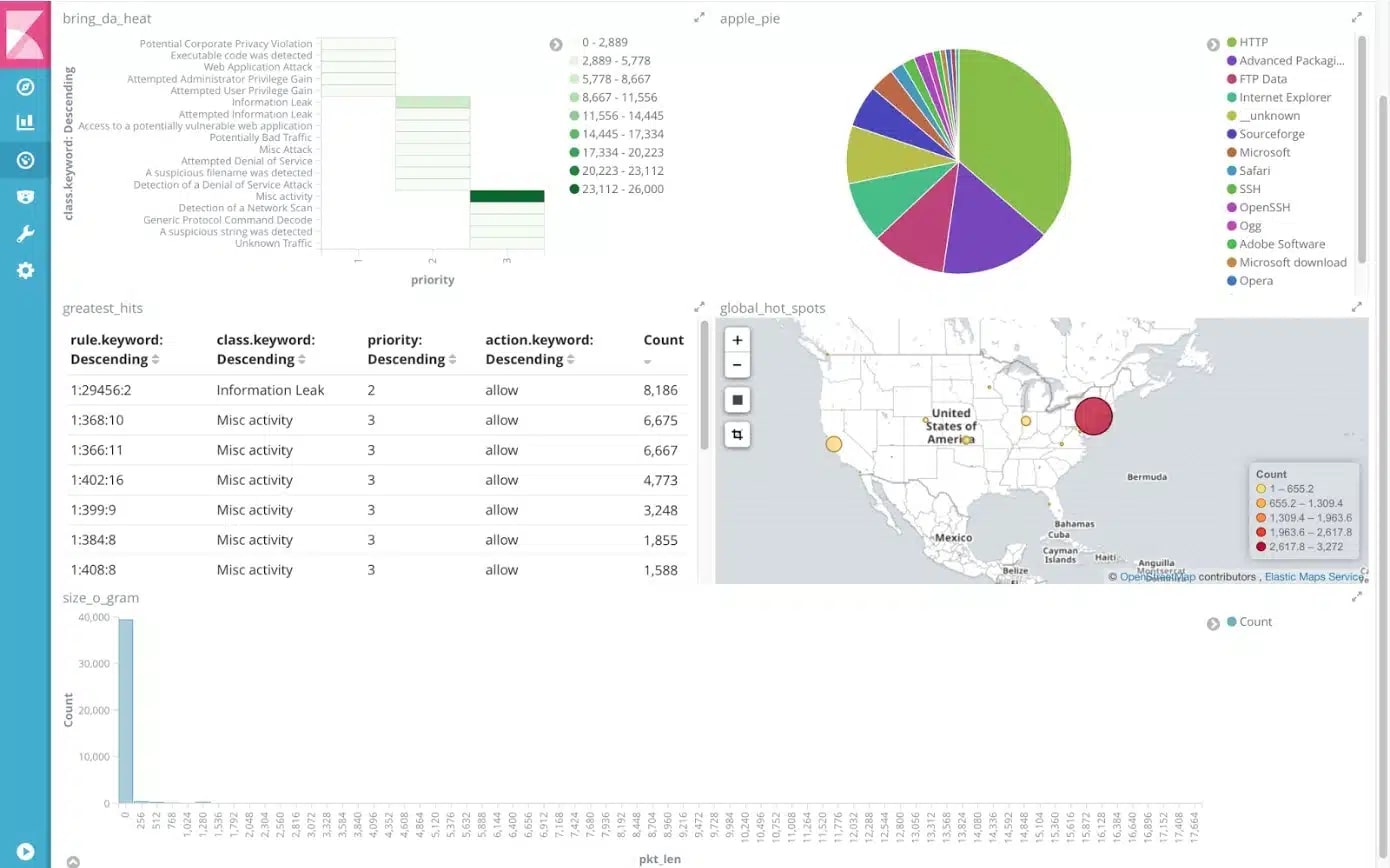
Snort is a well-known open-source network intrusion detection and prevention system (IDS/IPS). It operates by monitoring network traffic for suspicious activity based on a set of predefined rules, often called signatures. These signatures define patterns of malicious activity, allowing Snort to identify potential threats.
Key features:
- Real-time traffic analysis: Inspects network traffic in real-time, enabling immediate detection of potential threats
- Rule-based detection: Utilizes pre-defined rules to identify suspicious activity
- Packet logging: Logs captured network packets for further analysis and forensic investigations
- Alerting and notification: Alerts administrators about detected threats to enable timely response
Why do we recommend it and for whom?
We recommend Snort for security-savvy organizations seeking a customizable and powerful IDS/IPS solution. Its deep packet inspection, extensive rule customization, and active community support enable advanced threat detection. Snort shines in environments with technical expertise and a commitment to proactive network security, making it suitable for organizations ranging from security-focused businesses to research institutions and government agencies.
Pros:
- Highly customizable: Snort's open-source nature allows for extensive customization through custom rules, plugins, and integrations. This flexibility empowers tailoring detection capabilities to specific network environments and threats, unlike some pre-configured solutions
- Deep packet inspection: Unlike signature-based systems that only analyze headers, Snort performs deep packet inspection, analyzing the actual contents of packets for more granular threat detection, offering a robust defense against evolving attack methods
Cons:
- Steep learning curve: Setting up and customizing Snort effectively requires technical expertise in networking and security, making it less beginner-friendly compared to some user-friendly commercial solutions
In conclusion, Snort's unique strengths lie in its customizable nature, deep packet inspection, and active community. However, its learning curve, potential for false positives, and resource demands require careful consideration.
10. NetworkMiner
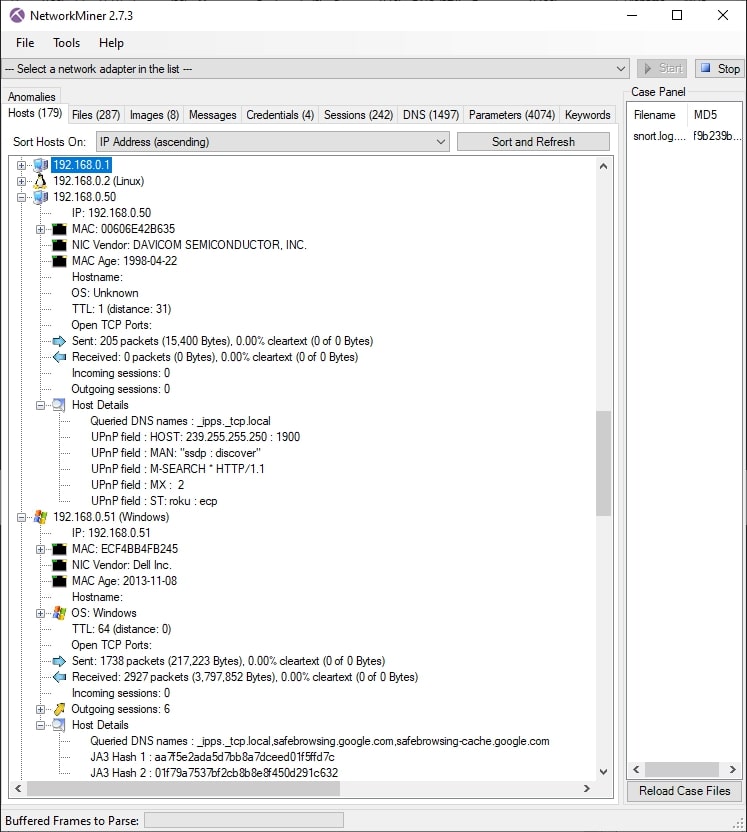
NetworkMiner is an open-source network forensic analysis tool (NFAT) primarily designed for extracting artifacts and information from captured network traffic. It can also be used to capture live network traffic through network interface sniffing.
Key features:
- Network packet capture: Captures network traffic live from an interface or analyzes pre-captured PCAP files
- Data extraction: Extracts a wide range of information from captured traffic, including files, emails, passwords, certificates, and more
- Protocol support: Supports a wide range of protocols, including HTTP, HTTPS, FTP, SMTP, and more
- Heuristics and filters: Utilizes heuristics and filters to identify and analyze specific types of data within network traffic
Why do we recommend it and for whom?
While other NFAT and packet sniffing tools offer similar functionalities, we recommend NetworkMiner for its unique combination of usability, affordability, and in-depth extraction capabilities.
Its intuitive interface makes it accessible even for non-technical users, while its open-source nature eliminates licensing costs. Beyond basic packet sniffing and analysis, NetworkMiner shines with its ability to extract valuable information like files, passwords, and certificates from captured traffic.
Pros:
- Cost-effective: Open-source and free, making it accessible to individuals and organizations with limited budgets
- User-friendly: Intuitive interface simplifies analysis even for users with limited technical expertise
- Powerful extraction capabilities: Retrieves valuable information from network traffic for diverse purposes like security investigations and forensics
Cons:
- Limited vendor support: As an open-source project, dedicated vendor support might be limited compared to commercial tools
In conclusion, NetworkMiner is a useful tool for extracting information and artifacts from network traffic. Its user-friendliness, open-source nature, and diverse functionalities suit network administrators seeking in-depth analysis capabilities. Nonetheless, consider its limitations in real-time monitoring, vendor support, and others before making a decision.

Post a Comment Community Rules
You need to login in order to post a comment
Not a member yet? Register Now